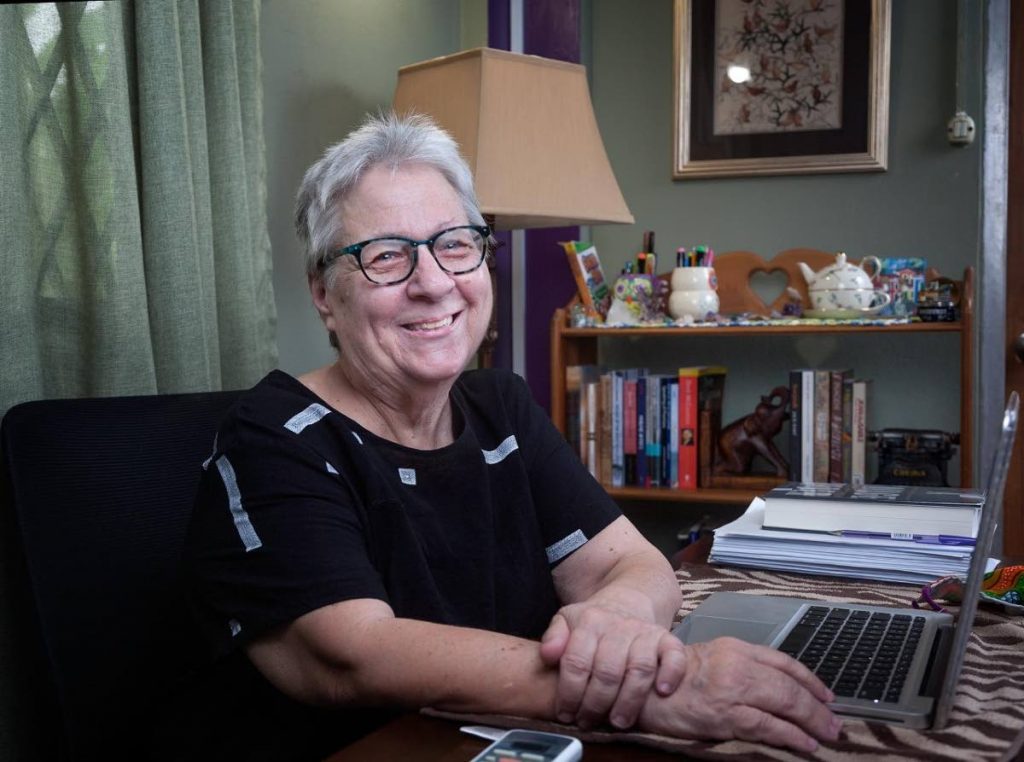A remarkable woman has left us

WE have truly lost a queen – in body, but not in spirit. The death of Sandra Des Vignes-Millington, Singing Sandra, last Thursday evoked an immeasurable amount of sadness over the passing of a strong woman and dedicated calypsonian.
In her life, Singing Sandra provided us with a musical mirror that reflected the humour and pain that defines Trinidad and Tobago. She never lost her roots; she never lost her humility.
Sandra served as a mother and role model in her community and on the calypso stage, where she demonstrated strength and success. Through her dedication to the Morvant community where she lived, Sandra showed us that everywhere in Trinidad deserves love and respect.
Sandra Des Vignes-Millington left an indelible mark on calypso. In my mind, after Calypso Rose, Sandra deserves the most credit for forging a path for calypso and soca women who enjoy the profession today. Sandra embodied the essence of the quintessential calypsonian. As an individual, she mostly embraced social commentary, but she perfected the fine art of humour as a member of the United Sisters.
She tackled women’s issues with confidence and dignity. One of my favourite calypso memories is seeing Sandra sing Sexy Employee, sometimes called Die with My Dignity, in Sparrow’s tent in 1987. With that calypso, she confronted the subject of sexual harassment in the work place.
It took a certain audacity to sing that calypso in Sparrow’s calypso house. Sandra brought down the house and elevated every woman in the audience.
Born in 1957, she left us far too early. Her heartfelt ability to address poverty and racism earned her the national calypso monarch title in 1999. She became the second woman to win the crown by delivering Song for Healing and Voices from the Ghetto. It had been a long, dry spell for women calypso monarchs from the time Rose took the first title in 1973 and again in 1977.
Sandra’s special gifts, her open-minded and willingness to collaborate in a profession that often seems self-centred, created a unique space within the the United Sisters.
With Beulah Bobb (Lady B); Joanne Rowley “Tigress” and Marvellous Marva (Joseph), Sandra and the United Sisters turned the tables on male calypsonians who had traditionally exploited humour with sexual innuendos that often degraded women. But they also embodied that proud Afro-Trinidadian heritage highlighted in Ambataila Woman.
Singing in lingerie, bright fluorescent pantsuits or other suitable costumes, the United Sisters terrorised the men in the audience with Whoa Donkey in 1993. They were our calypso soul sisters, the girl group that conjured up images of what the Supremes in the US might look like if they decided to “just let loose.”
As a group singing provocative calypsoes like Four Women to One Man, the United Sisters made a stinging social statement and reminded us how wining and sexual innuendo played an important historical role in cultural rebellion.
Sandra, a devout Baptist, cultivated a diverse repertoire in the best of calypso tradition. She used humour and social commentary to reach her audience in ways men could not. In the battle against racism and poverty, women suffered even worse than men and Sandra gave women a sense of power, a feeling of upliftment and a voice for their pain.
She had an uncanny ability to appear simple, caring, maternal and fierce. She served as both a queen and a warrior. Sandra embodied all those qualities at the same time and reflected this culture like a prism.
It is impossible to look at any women calypsonians or soca singers today and not see a reflection of Sandra. She gave her heart to calypso and her soul to this nation. She proved that women can and must be taken seriously in any profession and demonstrated that life lessons can be delivered in a serious or humorous manner. Singing Sandra’s music will always serve as an important milestone in calypso history.
My fondest memories of Sandra stem from the days of Kitchener’s Revue when I worked as an entertainment reporter covering the calypso tents during Carnival. Sometimes I stood in the back of the audience with pencil and paper in hand, furiously taking notes while Sandra held and gently bounced my daughter, Ijanaya in her arms.
Ijanaya slept while Sandra sang softly to her until someone announced Sandra’s turn to sing on stage. Then, Sandra handed me my baby and took centre stage to deliver some blistering social commentary. That was the essence of Sandra. Rest in peace and reign in heaven, my sister. You are calypso royalty.


Comments
"A remarkable woman has left us"